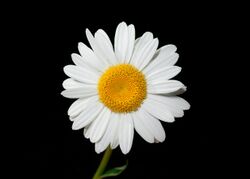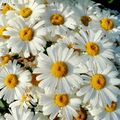Biology:Leucanthemum
| Leucanthemum | |
|---|---|

| |
| Leucanthemum vulgare | |
| Scientific classification Error creating thumbnail: Unable to save thumbnail to destination
| |
| Kingdom: | Plantae |
| Clade: | Tracheophytes |
| Clade: | Angiosperms |
| Clade: | Eudicots |
| Clade: | Asterids |
| Order: | Asterales |
| Family: | Asteraceae |
| Subfamily: | Asteroideae |
| Tribe: | Anthemideae |
| Genus: | Leucanthemum Mill., 1754 |
| Type species | |
| Leucanthemum vulgare Lam.
| |
| Species | |
|
See text | |
| Synonyms[1] | |
|
Phalacrodiscus Less. | |
Leucanthemum is a genus of flowering plants in the aster family, Asteraceae. It is mainly distributed in southern and central Europe.[2] Some species are known on other continents as introduced species, and some are cultivated as ornamental plants. The name Leucanthemum derives from the Greek words λευκός – leukos ("white") and ἄνθεμον – anthemon ("flower"). Common names for Leucanthemum species usually include the name daisy (e.g. ox-eye daisy, Shasta daisy), but "daisy" can also refer to numerous other genera in the Asteraceae family.
Description
Leucanthemum species are perennial plants growing from red-tipped rhizomes. The plant produces one erect stem usually reaching 40 to 130 centimeters tall, but known to exceed 2 meters at times. It is branching or unbranched and hairy to hairless. Some species have mainly basal leaves, and some have leaves along the stem, as well. Some leaves are borne on petioles, and others are sessile, attached to the stem at their bases. They vary in shape, and some are lobed or toothed.
The flower head is solitary, paired, or in a group of three on the stem. The base of the head is layered with up to 60 or more rough-edged phyllaries. The Leucanthemum head has about 13 to 34 ray florets of various widths, occasionally more, and rarely none. The ray florets are always white but fade pink with age. The head has over 100 yellow disc florets at the center. The fruit is a ribbed, hairless cypsela.[3]
Ecology
Leucanthemum species are used as food plants by the larvae of some Lepidoptera species, including the bucculatricid leaf-miners Bucculatrix argentisignella, B. leucanthemella, and B. nigricomella, which feed exclusively on Leucanthemum vulgare.
Diversity
Species include:[4]
- Leucanthemum adustum Gremli
- Leucanthemum aligulatum Vogt
- Leucanthemum aragonense (Asso) Samp.
- Leucanthemum atratum (Jacq.) DC.
- Leucanthemum burnatii Briq. & Cavill.
- Leucanthemum catalaunicum Vogt
- Leucanthemum coronopifolium Vill.
- Leucanthemum corsicum (Less.) DC.
- Leucanthemum cuneifolium H.J.Coste
- Leucanthemum discoideum (All.) Coste
- Leucanthemum gaudinii Dalla Torre
- Leucanthemum glaucophyllum (Briq. & Cavill.) Jahand.
- Leucanthemum gracilicaule (Dufour) Pau
- Leucanthemum graminifolium (L.) Lam.
- Leucanthemum grande (L.) P.Giraud
- Leucanthemum halleri Ducommun
- Leucanthemum heterophyllum (Willd.) DC.
- Leucanthemum illyricum Vogt & Greuter
- Leucanthemum ircutianum (Turcz.) Turcz. ex DC.
- Leucanthemum lacustre (Brot.) Samp.
- Leucanthemum latifolium DC.
- Leucanthemum lithopolitanicum (E.Mayer) Polatschek
- Leucanthemum maximum (Ramond) DC.[5] – max chrysanthemum
- Leucanthemum maestracense Vogt & F.H.Hellw.
- Leucanthemum meridionale Legrand
- Leucanthemum minimum Vill.
- Leucanthemum monspeliense (L.) H.J.Coste
- Leucanthemum montserratianum Vogt
- Leucanthemum pallens DC.
- Leucanthemum paludosum (Poir.) Bonnet & Barratte
- Leucanthemum platylepis Borbás
- Leucanthemum rohlenae Vogt & Greuter
- Leucanthemum rotundifolium DC.
- Leucanthemum sibiricum DC.
- Leucanthemum subglaucum De Laramb.
- Leucanthemum × superbum (Bergmans ex J.W.Ingram) D.H.Kent – Shasta daisy
- Leucanthemum sylvaticum (Brot.) Nyman
- Leucanthemum tridactylites (A.Kern. & Huter) Huter & al.
- Leucanthemum virgatum (Desr.) Clos
- Leucanthemum visianii (Gjurašin) Vogt & Greuter
- Leucanthemum vulgare (Vaill.) Lam. – ox-eye daisy
Hybrid
- Leucanthemum × superbum ( = L. lacustre × L. maximum) – Shasta daisy
Gallery
Leucanthemum maximum 'Crazy Daisy'
References
- ↑ "Leucanthemum Mill." (in en). Royal Botanic Gardens, Kew. http://www.plantsoftheworldonline.org/taxon/30008707-2.
- ↑ Greiner, Roland; Vogt, Robert; Oberprieler, Christoph (2012). "Phylogenetic studies in the polyploid complex of the genus Leucanthemum Mill. (Compositae, Anthemideae) based on cpDNA sequence variation". Plant Systematics and Evolution 298 (7): 1407–1414. doi:10.1007/s00606-012-0636-2.
- ↑ Leucanthemum. Flora of North America.
- ↑ "The Plant List: A Working List of All Plant Species". http://www.theplantlist.org/tpl1.1/search?q=leucanthemum.
- ↑ {{citation | mode = cs1 | title = Leucanthemum maximum | work = Germplasm Resources Information Network (GRIN) | url = https://npgsweb.ars-grin.gov/gringlobal/taxonomydetail.aspx?317334 | publisher = [[Organization:Agricultural Research ServAgricultural Research Service (ARS), United States Department of Agriculture (USDA) | access-date = 30 July 2014 }}
External links
Wikidata ☰ Q21040 entry
 |






